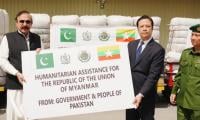Assembly, on 20th December 2013, decided to celebrate every year the 3rd March as World Wildlife Day. It is the same day when the Convention on International Trade in Endangered Species of Wild Fauna and Flora (CITES) was adopted in 1973.
“Pakistan with its unique geographical location and climatic conditions has a varied and interesting mix of flora and fauna. These beautiful species have aesthetic value besides providing numerous ecosystem services which are necessary for delicate balance of life,” the minister highlighted.
Mushahid Ullah Khan also reaffirmed that as a signatory to CITES, Pakistan remains committed to ensure that international trade of wild fauna and flora is not detrimental to their survival. Pakistan’s wildlife includes 668 species of birds, 195 species of mammals and 192 species of reptiles. He said that for protection and conservation of these species and their habitat, a network of protected areas are already in place working under the Provincial Wildlife Protection Laws. These include 26 National Parks, 92 Wildlife Sanctuaries, 89 Game Reserves and 115 Community Reserve. The network of protected areas covers about 12% of the land area of Pakistan, Mr. Khan elaborated.
Highlighting Pakistan’s role in conservation and protection of the wildlife, the minister said that the country has been an active member of international community for conservation of wildlife and has participated in regional initiatives like South Asia Wildlife Enforcement Network (SAWEN). The enactment of Pakistan Trade Control of Wild Fauna and Flora Act 2012 at the Federal level has been a major landmark achievement of the Ministry of Climate Change. This law provides domestic legal authority to implement the international law, he added.
The local communities get 80 per cent share of the revenue generated, which is used for conservation and socio-economic uplift. This incentive has helped to reduce wildlife crime in mountainous areas of Pakistan, he added. The federal climate change minister pressed on need for raising awareness about seriousness of wildlife crime and its negative impacts on [biological] ecosystem and said, “It is critical for safeguarding our natural resources for future generations.”
The trend of smuggling of wild species that have no domestic threat like turtles and pangolin has raised alarm all over the world, he pointed out. “However, I commend the efforts of the Ministry of Climate Change, Pakistan Customs and Provinces that are working hard to check smuggling of wildlife species from Pakistan,” the minister said and urged the Pakistan Customs and the provincial authorities to double their efforts to conserve Pakistan’s natural assets from the menace of smuggling. He also urged the people to join the government’s efforts to eliminate wildlife crime from Pakistan.
Muslims attend the Eid prayer at a mosque in Rawalpindi, Pakistan September 2, 2017. —ReutersISLAMABAD: Following...
A jeweller waits for a customers at a shop on June 26, 2024. — AFPRawalpindi : The employee of a jewellery shop has...
Well-known poet Akhtar Raza Saleemi seen in this image. — Facebook@Akhtar Raza Saleemi/FileAkhtar Raza Saleemi is...
Beggars ask for alms outside a mosque in Pakistan. — Reuters/FileIslamabad : Islamabad’s district administration...
Families busy shopping on Chaand Raat in preparation for Eid ul Fitr at local market on March 30, 2025. —...
Vendors are selling vegetables at a market on March 26, 2023. — OnlineRawalpindi : The prices of essential food...







